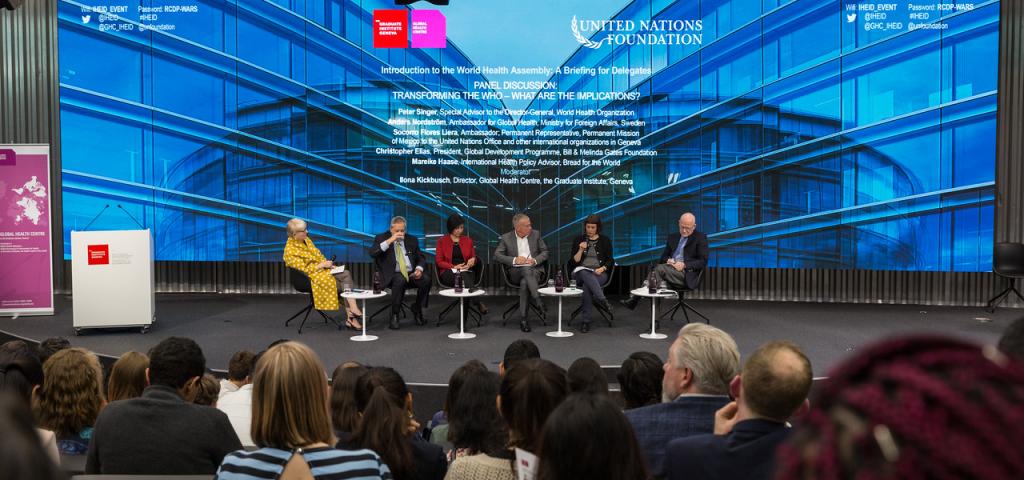In March 2019, the World Health Organization unveiled a new reform to modernise the institution and strengthen its strategy. The changes announced by Director-General Tedros Adhanom Ghebreyesus aim to support WHO’s triple billion targets plan through new ways of working and fresh perspectives. In order to help governments in reaching the Sustainable Development Goals and ensure affordable and high-quality health services to all, the agency redesigned its processes in multiple areas. This transformation aims to strengthen WHO’s long-term financial stability, invest in a dynamic and diverse workforce, harness the power of digital health and innovation, reinforce WHO’s normative role in all countries, and increase WHO’s activities in emergency preparedness and response.
The transformation of WHO was also a central topic of discussion during the 72nd session of the World Health Assembly. On 19 May 2019, the Global Health Centre and the United Nations Foundation gathered multiple experts to share their perspectives on these WHO changes during their Annual Introductory Briefing for WHA delegates. This year’s edition, moderated by Ilona Kickbusch and Ambassador John E. Lang focused on the implications of the WHO transformation.
Five internal and external areas (strategy, process, operating model, culture and partnership) have been reimagined by WHO in order to improve impact and achieve the highest attainable standard of health for all people. States representatives of Mexico and Sweden were invited to express how countries experience the changes announced by the health agency. Ambassador Flores Socorro Liera, Representative of the Permanent Mission of Mexico to the United Nations Office, stressed the fact that WHO plays a normative role in many countries and that Mexico welcomes this transformation as multiple actions are required to become more efficient. The Ambassador explained that Mexico’s collaboration with WHO has helped the country progress towards the SDGs. The government supports the agency but also sets its own areas of priorities such as better transparency and accountability, gender parity and a zero tolerance policy towards harassment.
Anders Nordström, Ambassador for Global Health at the Sweden Ministry for Foreign Affairs, described this transformation agenda as a good start but believes that the evolution must go further to ensure that people are living long and healthy lives. The world is changing and countries such as Sweden need to provide healthcare and create an environment which enables people to make healthy choices. Anders Nordström expects bigger changes in the future: “We usually develop our health plan copying WHO but we also need to address critical factors such as good nutrition, daily physical activity and health promotion”.
WHO’s financial needs were also highlighted during the event. Mareike Haase, International Health Policy Advisor at Bread for the World, stressed that WHO is highly dependent on voluntary donations and that the agency needs to generate larger contributions from Member Sates in order to become more flexible and independent. WHO’s transformation process proposes a new model of financing but the impacts of the organisation are also strongly related to its partners. While many health organisations are pushing for different agendas, they have to ability to strengthen WHO and collaboratively fight for a wider global health objective. Christopher Elias, President of Global Development Programmes at the Bill & Melida Gates Foundation, explained how this dimension can support WHO’s strategy: “the UHC agenda is in itself transformational and has the potential to coordinate the efforts of all health actors towards the same complex goals”.
Peter Singer, Special Advisor to the Director-General at WHO, recognised that the organisation needs to transform at the country level in order to support specific national priorities. An effective global action plan must involve a country focus, the development of public goods and the establishment of WHO’s normative role.
Current global issues such as health emergencies and the current Ebola crisis in DRC, the Nagoya protocol and its implications for public health, antimicrobial resistance and the misuse of antibiotics, and Universal Health Coverage were also discussed during the event with WHO experts. Access to medicine was one of the main important themes addressed at the 72nd WHA and Andrew Rintoul, Scientist at WHO, presented the new draft resolution regarding the transparency of markets for medicines, vaccines and other health related technologies. Andrew Rintoul explored how drug transparency can help countries negotiate more affordable prices and therefore increase access to treatments and health products.
The key issues raised during the event demonstrated that the world is constantly changing and challenged by new factors such as pathogens, markets or viruses. Transformation and innovation are therefore essential tools which can develop and readjust WHO’s activities and strategies.


